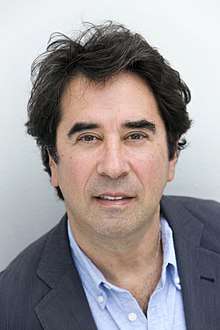Allen Hershkowitz
Allen Hershkowitz is an American environmental scientist who worked as a senior scientist at Natural Resources Defense Council from 1988 to 2014 and then at the Green Sports Alliance.

Career
Hershkowitz started working at the Natural Resources Defense Council (NRDC) around 1988.[1]
In 2007, the Academy of Motion Picture Arts and Sciences approached the NRDC for advice about how to reduce the carbon footprint of the Oscar Awards show, after the academy was asked to do so by one of the producers of An Inconvenient Truth. Hershkowitz, in his role as a senior scientist at the NRDC, helped them from 2007 to 2011.[2] Similarly, The Recording Academy asked the NRDC for help greening the Grammy Awards starting in 2008, and Hershkowitz led that effort as well.[3]
At an NRDC staff retreat in 2004, board member Robert Redford suggested that the NRDC establish more of a presence at professional sporting events; Hershkowitz told a reporter from Mother Jones: "We were trying to figure out how to reach out to untraditional allies, and Redford says to us, 'You know, if you want to meet Americans, you’ve got to go to a baseball game or a football game. You’ve got to go to one of these stadiums. That’s where America is.'"[4] Hershkowitz met with Bud Selig of the Major League Baseball (MLB) shortly after that, and soon the NRDC was creating white papers and teams to advise all the major sports leagues about environmental sustainability initiatives that addressed each sport's needs and could help them save money.[4] Hershkowitz eventually ran the Sports Greening Initiative at the NRDC.[5]
The Green Sports Alliance got started in the late 2000s as informal discussions among management of sports teams in the Pacific Northwest, about how to improve their operations' sustainability.[4][6] The idea of formalizing an alliance was generated in a meeting between Hershkowitz and representatives of sports teams owned by Paul Allen via Vulcan Inc., and GSA formally launched in the spring of 2011, with NDRC as one of the founding organizations.[7] In 2014 Hershkowitz left the NRDC and became president of the GSA.[8]
In December 2015, Hershkowitz was listed as the 50th most influential person in the field of sports business by the Sports Business Daily, which was the first time he had been on the list. By the time of the listing, he had provided environmental sustainability advice to the NBA, the NHL, MLB, Major League Soccer, and the U.S. Tennis Association that, according to the listing, had saved the leagues millions of dollars.[9][10][1]
In December 2015, the GSA under Hershkowitz's leadership helped organize two summits on sports sustainability at the 2015 United Nations Climate Change Conference[11] The participation of representatives from major American professional sports associations marked the first time the sports industry were directly involved with climate change initiatives by the United Nations.[12]
In June 2016 Hershkowitz left the GSA to focus on more global issues.[13] In December 2016 Sports and Sustainability International was formally launched; Hershkowitz was a member of its organizing committee, along with four other founding directors.[14]
Publications
- Hershkowitz, Allen (1986). Garbage burning : lessons from Europe: consensus and controversy in four European states. New York, N.Y.: INFORM. ISBN 978-0918780348.
- Hershkowitz, Allen; Salerni, Eugene (1987). Garbage management in Japan : leading the way. New York, NY: INFORM. ISBN 978-0918780430.
- Underwood, Joanna D.; Hershkowitz, Allen; Kadt, Maarten de (1988). Garbage : practices, problems & remedies. New York, N.Y.: INFORM. ISBN 9780918780478.
- Hershkowitz, Allen (1997). Too Good to Throw Away: Recycling's Proven Record. Natural Resources Defense Council, Incorporated. ISBN 9781893340138.
- National Research Council (1999). Waste Incineration and Public Health (Note: Hershkowitz was a member of the Committee on Health Effects of Waste Incineration that produced this). National Academies Press. ISBN 9780309063715.
- Hershkowitz, Allen (2002). Bronx ecology : Blueprint for a new environmentalism. Washington: Island Press. ISBN 978-1559638647.
- Hershkowitz, Allen (2011). "Life is God's Masterpiece". In J. Henry Fair (ed.). The Day After Tomorrow: Images of Our Earth in Crisis. PowerHouse Books. ISBN 9781576875605.
References
- Pratt, Timothy (18 December 2014). "NHL fights global warming by going carbon neutral". The Guardian.
- Carpenter, Susan (4 February 2011). "Stepping out on the recycled red carpet". LA Times Blogs - Greenspace.
- "Green Grammys Honor Great Music With Smaller Carbon Footprint". Environmental News Service. February 11, 2008.
- Gordon, Ian (October 24, 2011). "Can Stadium Sports Really Be Green?". Mother Jones.
- Belson, Ken (25 October 2011). "Sports Industry Expands Its Environmental Initiatives". The New York Times.
- Steinbach, Paul (September 2010). "Conservation is King at Seattle's Safeco Field - Athletic Business". Athletic Business.
- O'Brien, Luke (8 August 2011). "Green Sports Alliance: Go Green Or Go Home". Fast Company.
- "Press release: Green Sports Alliance Ushers in New Era of Influence". Green Sports Alliance. 24 November 2014.
- "50 Most Influential: No. 50 — Allen Hershkowitz". Sports Business Daily. December 7, 2015.
- Belson, Ken (2 September 2011). "A Future for the Used-Up Tools of the Tennis Trade". The New York Times.
- Blaustein, Lew. "The Paris Tragedy, COP21 and the Sustainable Innovation in Sport Symposium". GreenSportsBlog. Retrieved 20 November 2015.
- Nelson, Adam. "Sustainable Innovation in Sport: leading the line in the battle against climate change". SportsPro. SportsPro Media Limited. Retrieved 14 December 2015.
- "Press release: Green Sports Alliance President Allen Hershkowitz Departs to Pursue Global Green Sports Work -". Green Sports Alliance. 22 June 2016.
- "Green-Sports Experts Launch "Sport and Sustainability International"". GreenSportsBlog. 15 December 2016.
External links
- Column archive at The Huffington Post